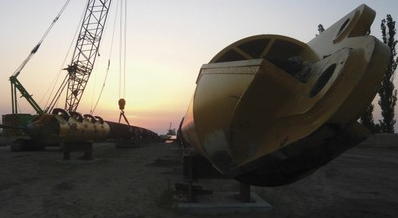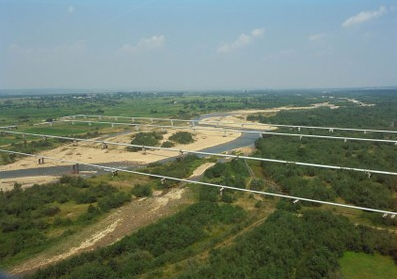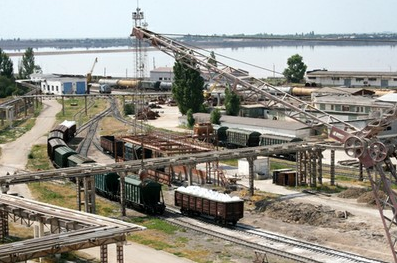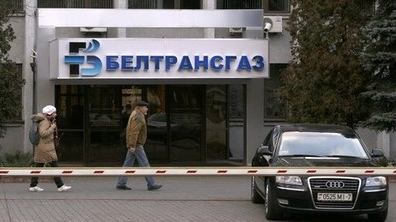Ukraine - in between Nord and South
Russia and Ukraine have put gas talks on hold for over a month now. It is likely that negotiations will continue after Russia's presidential elections. However, Ukraine's position in reaching a package deal with Russia, concerning a lower gas price and the future of its gas transit system (GTS), has weakened. As Gazprom spokesperson Sergey Kupriyanov put it on 22 February, after the construction of Nord Stream and South Stream is completed, Ukraine will play "zero role" in the export of Russian gas. Dr. Konstantin Simonov from the Moscow based National Energy Security Fund believes that a deal with Ukraine will nevertheless be reached this year.
Impact of Nord Stream and Yamal-Europe
Before the end of this year, Gazprom will have 55 BCM/yr of alternative export capacity available through the Nord Stream pipeline, which it intends to use already in 2012. According to Slovak pipeline operator Eustream, which transits the bulk of Russian gas coming in from Ukraine at Slovak entry point of Velke Kapushany, by the end of 2012 Russian transit volumes will be 15% less. This will be as a direct consequence of Nord Stream coming into operation.
In addition, in November 2011 Gazprom acquired the remaining 50% share in Beltranzgaz, Belarus' natural gas transportation company. The takeover gave Gazprom 100% control over the Yamal-Europe gas pipeline up to the EU's border in Poland. Consequently, Gazprom was quick to make use of its newly acquired asset. On 27 January, the company announced that it will increase transit volumes through Belarus by almost 13% or 4 BCM to approx. 35 BCM in 2012, compared to 2011.
This downward trend is at least to continue until 2020, according to a study by renowned energy consulting agency IHS CERA, released mid-January. The study, which was ordered by the Ukrainian Ministry of Energy, foresees that in the mid-term transit volumes through Ukraine will continue to drop as a result of Nord Stream and might stabilise after 2020.

Nord Stream's second string being pulled onto the German shore. Before the end of 2012, 55 BCM/yr of transport capacity will available. Source: Nord Stream AG
South Stream not final
Of course, there is the 63 BCM/yr South Stream pipeline that could even further decrease Gazprom's transit dependency on Ukraine. The prestigious pipeline project seems to be gaining more momentum in the past months. On 28 December, the Turkish Ministry of Foreign Affairs officially informed its Russian colleagues that it had approved of South Stream to cross Turkey's exclusive economic zone in the Black Sea. Two days later Russian Prime Minister Putin officially instructed Gazprom to speed up the process and start the construction of the offshore part by December 2012. Also judging by recent statements from Gazprom's CEO, Alexey Miller, South Stream is closely sticking to its time line. On 15 January, Miller was quoted in Russian media as saying: "Without exaggeration I can say that Gazprom is working on the project 24 hours a day."
However, Gazprom seems to keep some room for manoeuvrability with regard to the capacity of the pipeline, as was shown at the in-house 'Investor Day' at Gazprom's main office in Moscow, on 10 February. The head of Gazprom Export, Alexander Medvedev, explained to representatives of investment companies and banks that one string (15,8 BCM/yr) could suffice in case Gazprom would obtain a share in Ukraine's gas transit system (GTS). Thus, Gazprom has given a clear sign that the outcome of negotiations with Ukraine will be decisive for South Stream. A similar message was given late December 2011 by Miller, saying that the realisation of the South Stream project had always been connected to talks with Ukraine.
Can Gazprom do without Ukraine's GTS?
Dr. Konstantin Simonov from the Moscow based National Energy Security Fund told EEO that in theory Russia can do without Ukraine. The joint capacity of South Stream and Nord Stream pipelines is 118 BCM/yr, which is more or less equal to transit volumes through Ukraine. Data from UkrTranzGaz, Ukraine's newly established pipeline operator, show that in 2011 Ukraine transited 104 BCM of mainly Russian gas to Europe. Gazprom spokesman, Sergey Kupriyanov, expressed a similar view on 22 February, stating that Ukraine will have "zero role" in Russian gas exports, after the construction of Nord Stream and South Stream is completed.
According to Dr. Simonov, Gazprom exported around 150 BCM in 2011 to Europe. Interestingly, Dr. Simonov does not believe exports to Europe will increase in such quantities that Ukraine's GTS will still be needed after both Nord Stream and South Stream are constructed. However, if Gazprom gains control over Ukraine's GTS, it will not have to build South Stream in its full capacity, not all four strings at least, Dr. Simonov concludes. Indeed, Gazprom's Head Alexey Miller has recently stated that South Stream's construction is interconnected with Ukraine's GTS.
In determining whether Gazprom can do without transit through Ukraine, much of course depends on how European gas demand will develop and to what extent Russian gas will cover this incremental demand. There remains still much uncertainty in this respect. Most of the demand scenarios for the EU vary between 500 BCM - 700 BCM by 2030. Taking into account that demand for gas in the EU will inevitably increase, it is likely that Ukraine will continue to play a role as a transit country. At least, this view was expressed by a representative of the EC, Isaac Valero Ladron, on 23 February.

Ukrainian transit pipelines. Can Gazprom do without Ukraine's GTS, after bringing on stream Nord and South Stream? Source: Naftogaz
Diversification of routes not limited to gas
Russia's efforts to create alternatives to transit through Ukraine are not limited to gas only. In February it became known that Russian oil transportation company Transneft is engaged in talks with German and Czech companies on building an alternative oil pipeline, which would export Russian crude to Central Europe bypassing Ukraine. Whether Russia is seriously considering this option remains to be seen. It might also be an attempt to increase pressure in the gas talks with Ukraine.
In return for $ 220 per 1,000 CM
According to unofficial information obtained by Russian business daily Kommersant and later confirmed by a high-ranking Ukrainian official mid-December, one of the latest round of talks between the Russian and Ukrainian sides looked as follows. Both sides were reportedly discussing to establish two separate joint ventures (JV) between Gazprom and Naftogaz, one of which would control Ukraine's GTS. The other would control Ukraine's internal gas grid. The same newspaper also reported that Gazprom was prepared to offer Ukraine a gas price of $ 220 per 1,000 TCM, almost half of the current price, in return for a half of the shares in the GTS.
More information became available on the content of the talks, when Russian daily Vedomosti wrote on 20 January that it had laid hands on a copy of an agreement "On broadening cooperation in the gas sector". The agreement had been proposed by the Russian side, but Ukraine had refused to sign it. If true, the report gave some insight into the state of affairs. The agreement foresaw the establishment of two JV by Gazprom and Naftogaz, as mentioned earlier. In the JV that would control Ukraine's GTS, Gazprom and Naftogaz would together set the preconditions for the participation of European partners in a later stage, which would receive a 33% share in the JV. Gazprom would similarly have a 33% share and Naftogaz would control the remaining 34%. What is noteworthy is that Gazprom would pay for its share in the JV with its own company company stocks.
The second JV was, amongst others, supposed to have a monopoly on gas imports to Ukraine and have exclusive rights on the sale and distribution of gas within Ukraine. Another very important part of the agreement, supposedly, was that Gazprom would be freed from the possible introduction of the EU's 3rd Energy Package rules in Ukraine. In other words, the JVs were to maintain their rights to be simultaneously involved in production, transportation and distribution activities.
If the report by Vedomosti indeed is true, then it is not a surprise why Ukraine refused to sign it. Although the first JV would give Naftogaz a 34% share, the second JV would in essence indirectly give Gazprom an import monopoly on Russian gas into Ukraine, which would of course be against Ukraine's interests to diversify gas supplies. The provision would have eliminated the gas businesses of oligarchs, such as Dimitry Firtash, who in 2011 imported around 5,5 BCM of Central Asian gas.
The role of Ukraine's oligarchs
Gazprom must surely have been aware of the fact that the demands in the agreement could hardly be accepted by Ukraine. Therefore it might have been deliberately pursuing a strategy of 'an offer you can only refuse'. A possible reason for this might be that Gazprom would like to buy some more time, since time is on its side. Moreover, it might want to await the outcome of a power struggle between Ukrainian interest groups over the control of industrial and financial resources of the country, including control over Russian gas purchases and sales, which is currently being fought out.
Although there are little public sources to substantiate the details of this struggle, political insiders claim that if in the past RusUkrErnergo, controlled by the interest group around Dimitry Firtash, profited mostly from the purchase and sale of Russian gas, today the family of Ukrainian President Viktor Yanukovich is trying to gain control over this lucrative business. In this respect, it is establishing a new power base with control over, amongst others, media and government key posts. Gazprom, therefore, allegedly wants to await which interest group will seize control before it signs a new agreement, as not to return to the negotiation table again.
As noted above, Naftogaz is not the only importer of natural gas to Ukraine. OstChem Holding Limited, under the control of Dimitry Firtash, imported around 5,5 BCM of Central Asian gas in 2011 and plans to import around 8 BCM in 2012. However, in January the price of this Central Asian gas was above the price as sold by Gazprom and on 20 January the company halted the import of Central Asian gas due to its rising price.

The Crimean Soda Plant is part of the Ostchem Holding Ltd. Ostchem plans to import around 8 BCM of Central Asian gas in 2012. Source: Ostchem
Ukraine in the Eurasian Space
Little imagination is needed to predict who will be elected as Russia's next president on 4 March. Nevertheless, in his pre-election campaign Vladimir Putin cannot afford to make any concessions to Ukraine, which partially explains why negotiations have been put on hold. With the return of Vladimir Putin as Russia's president, Russia's regional and foreign policy aimed at creating a joint Eurasian space, including a Common Economic Space and a Customs Union, are likely to receive a new impulse. With the strategic countries of Belarus and Kazakhstan already being part of the Eurasian space, efforts to bring on board Ukraine will probably increase. In this respect, a new 'gas deal' with Ukraine might serve as an important instrument as part of a greater package deal.
In return for lower gas prices, Russia has offered Ukraine to join the Customs Union (CU), as Kazakhstan and Belarus did, and refrain from entering into Deep and Comprehensive Free Trade Agreement (DCFTA) with the EU. Ironically, it has meanwhile become the EU that is refraining from the DCFTA, since the political climate under Yanukovich has showed undemocratic tendencies, such as the persecution of Yulia Timoshenko. Russia's offer to join the customs union still stands, as was recently illustrated by Chairman of the Russian Duma, Sergey Naryshkin when speaking at Ukraine's Diplomatic Academy in Kiev on 20 February. Naryshkin stated that if Ukraine would enter the CU, gas prices for Ukraine would be equal to prices paid be Russian consumers.
The example of Belarus
Indeed, Ukraine's neighbour, Belarus, as part of a package deal sold off its entire GTS to Gazprom late November and in such a way has guaranteed tax incomes from transit volumes and a lower gas price for its struggling economy. Also, entering the CU of course proved more than helpful to get access to lower gas prices. The package deal saved the Belarus economy from a collapse, according to the country's First Deputy Prime Minister, Vladimir Semashko. On 17 February, Semashko told press that without the package deal Belarus would today have paid over $ 300 per 1,000 CM, which would have lead its economy into a catastrophe. This year Belarus is paying $ 165,6 per 1,000 CM, a price close to the Russian domestic gas price. The package deal with Belarus simultaneously send out a clear to Ukraine that a lower gas price is possible, something which cannot have gone unnoticed to Ukraine.

Beltransgaz' office in Minsk. Beltransgaz is 100% owned by Gazprom. Source: telegraf.by
The Turkish Straits and LNG
In the meantime Ukraine has been actively searching for alternative supplies of gas and energy. One of these alternatives is to build an LNG-terminal with a capacity of up to 10 BCM/yr, either close to the ports of Odessa or Nikolayev. Also, Ukraine is reportedly considering a less capital intensive solution, namely a floating facility where it could receive LNG shipments, so called Floating LNG (FLNG). However, the question remains from where Ukraine could draw LNG supplies, since Turkey refuses to let any LNG-tankers pass through its straits.
Although energy relations between the Turkey and Ukraine seemed to have 'warmed' recently as a result of the cold winter conditions, it seems unlikely that Turkey will allow LNG-tankers to cross into the Black Sea. On 15 February, during a visit to Kiev, Turkey's Energy Minister, Taner Yildiz, expressed his gratitude for how Ukraine supplied Turkey with additional volumes during the recent extreme colds. Also, Taner believed that the fruitful cooperation between Ukraine and Turkey would continue. However, no concrete examples were put forward by the Turkish side on what shape such a "fruitful cooperation" could take.
So, for Ukraine the only alternative is Azerbaijan, as it is the only country that could supply it with LNG from within the Black Sea through a yet to build LNG-plant in Georgia. But even this option seems to be out of Ukraine's reach. At the World Economic Forum in Davos, Azerbaijan's President Aliyev in the final moment withdrew from signing an earlier prepared agreement on LNG supplies to Ukraine. Allegedly, the reason behind the sudden withdrawal were Azerbaijan's objections to Ukrainian arms sales to Armenia. Azerbaijan's breakaway region Nagorno-Karabach, inhabited by ethnic Armenians, receives military support from Armenia. However, it has been suggested that Turkey demanded from Azerbaijan further consultations with regard to the issue. From Turkey's perspective it is clear that it would rather see Caspian gas reach European markets across the Turkish mainland, as it aspires to become the main transit hub for Caspian gas to Europe.
.png)
The presidents of Azerbaijan, Ilham Aliyev (left), and of Ukraine, Viktor Yanukovich (right), in Davos. In the final moment Azerbaijan reportedly withdrew from signing an agreement to supply LNG to Ukraine. Source: president.az
Still not too late
Already the price for Brent has risen above $ 120 / barrel. If the situation around Iran continues to deteriorate, possibly into an armed conflict, oil prices could jump up to $ 150 or more per barrel. Ukraine would then be presented with a gas price of $ 700 / 1,000 CM, something which it will hardly be able to last for a long time. Though financial pressure is rising on Ukraine, there is still room to reach a deal.
According to Dr. Konstantin Simonov, Ukraine has a lot to lose if it does not reach an agreement with Gazprom. It annually receives $ 4 bln in revenues from the transit of Russian gas, something it eventually could lose. On the other hand, it has a lot to gain if it reaches an agreement with Gazprom, which would guarantee transit volumes and cheaper gas for itself, Dr. Simonov believes. Asked why Ukraine nevertheless remains hesitant, Dr. Simonov replied that in case Gazprom would acquire a share in its GTS, Yanukovich fears Ukraine will have lost its last instrument which gives it leverage over Russia. Nevertheless, Ukraine, Dr. Simonov believes, will not be able to live with such high gas prices and therefore it is very likely than an agreement will be reached in the course of this year.
This article originally appeared on Eurasia Energy Observer. Republished with permission


